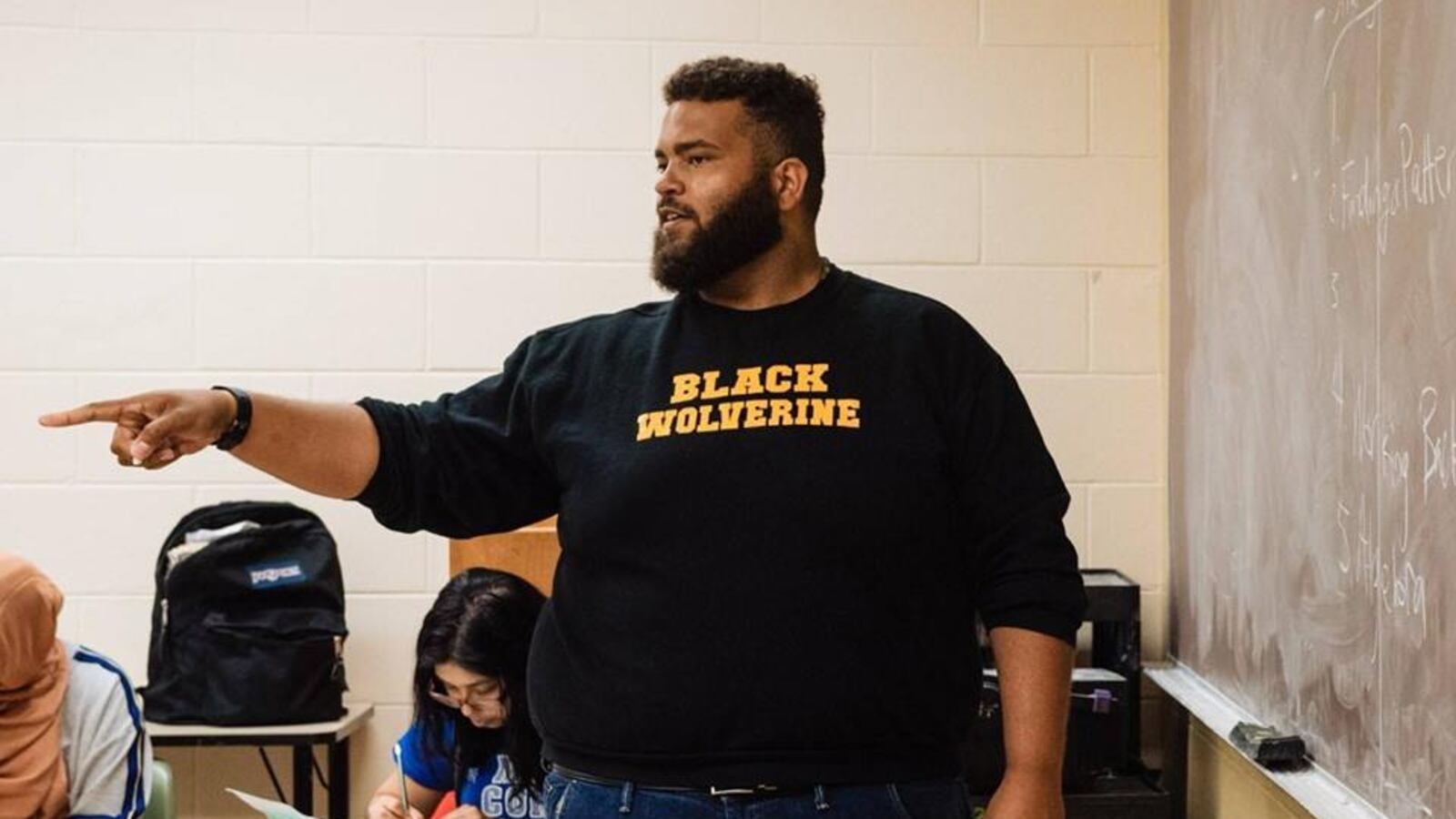Here, in a feature we call How I Teach, we ask educators who’ve been recognized for their work how they approach their jobs. You can see other pieces in the series here.
Asked what he teaches, Michael Chrzan says “mathematics.” Because in his classroom at Henry Ford Academy, a charter high school in Detroit, math is more than the calculations you need to tip a server or balance a budget. Chrzan, a third-year teacher, sees the abstract reasoning skills of mathematics — the proofs and deductions — as tools to help his students develop a firmer grasp on every aspect of their world.
This is just one of the ways he is unusual. A Teach for America alumnus, Chrzan also went through a traditional teacher training program in college. He is a African-American male math teacher in a country that produces far too few of them. And remember the Pokemon Go craze? He still plays.
Less than a week before Chrzan is to be honored as Teach for America’s teacher of the year in Detroit, Chalkbeat spoke with him about his dealings with parents, the toughest parts of his job, his social media habits, and how he finds “greatness” in every student.
Was there a moment when you decided to become a teacher?
I’ve been teaching in some capacity — teaching or tutoring — since high school. I was a teaching assistant at a summer camp at Wayne State called Math Corps. I caught the bug for teaching there. I did that for three summers. I knew at some point in my life that I would get back into teaching. In college, I took a couple of computer science and math and education classes. And the computer science classes were fun, but I was like, this is just a hobby.
Tell us about a favorite lesson to teach. Where did the idea come from?
I taught geometry the last two years. It’s really a beautiful class because it’s the only class in high school where kids do the work of professional mathematicians. It’s the only class where they do proofs. So we get to have a really rigorous conversation about what makes something true, which is really important in our society right now.
Every year I pull in examples of deductive reasoning from outside of mathematics too.
One of the things I’m going to try this year is bringing in a Supreme Court decision and talking about the deductive reasoning that shows up there.
Tell us about a memorable time — good or bad — when contact with a student’s family changed your perspective or approach.
I had a conversation with a very young student’s mother who had the frame of mind that he was responsible for himself.
I was calling to talk about some issues that I’d seen on his homework, and just about getting it completed. That’s a really important part of the learning, that independent practice. And she was very much of the mindset that I needed to have that conversation with him, not her. It was not her job for him to get that done.
It changed how I discussed things with him because it got a much deeper understanding of what he has to deal with outside of these four walls.
What part of your job is most difficult?
The hardest part is motivating students. There are some students who have a really long history of messaging that they’ve gotten from schools, of the kind of person and students they are. I try to reverse that. You plant a seed when you’re the one teacher who’s telling them something different, but sometimes you don’t get to see that seed bloom in one year.
What was the biggest misconception that you initially brought to teaching?
That I was ready for it. I did a lot of pre-professional teaching things. In college, I went to New York for two summers and taught in a program called Breakthrough. I did student teaching. I did Teach for America. I was like, I’ve got to be ready for this, I’ve got so much more experience than most people do when they enter the profession.
I was not ready. There’s is nothing that will prepare you for day in and day out being responsible for your kids’ learning.
What are you reading for enjoyment?
“Children of Blood and Bone,” by Tomi Adeyemi. It’s possibly one of my favorite books of all time. As a millennial, I’m very into social media. I will typically lull myself to sleep on Instagram. And I’ve gotten back into Pokemon Go.
What’s the best advice you’ve received about teaching?
There are two. I can’t decide which I like better. The first would be, ‘don’t take anything personally.’ That really helped me understand that if I’m having a management issue with a kid, it may not have anything to do with me, that’s probably a kid who needs help. And that pairs up with assuming the best of my students. They came to class because they want to learn, and maybe something got in the way. I try to find their greatness, whether it’s math or otherwise. That’s a more human way to see students, and it opens them up to new things, like trying difficult mathematics.


